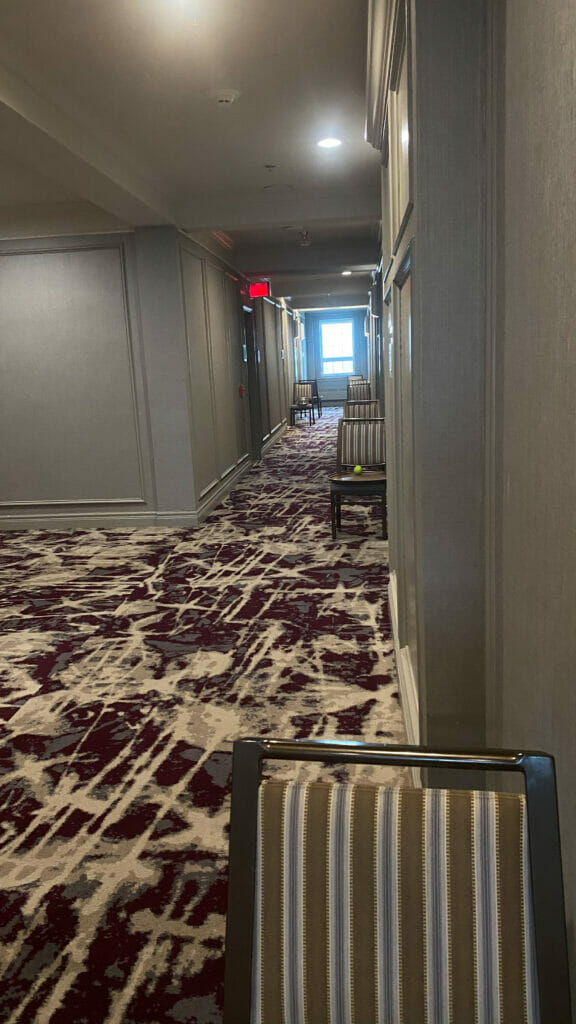
International students frustrated in hotel quarantine
Dal imposes hefty mandatory self-isolation expenses

One constant has remained throughout this unpredictable virtual academic year at Dalhousie University: international students are still paying the most tuition and receiving the least support.
After paying double the price of their Canadian classmates in undergraduate tuition, international students returning to Halifax this winter are being forced to pay hundreds of dollars to complete a 14-day self-isolation at the Westin Nova Scotian hotel in downtown Halifax.
The total cost for the isolation is $1,627. Dal is covering 50 per cent of the cost for students returning to Canada for the first time since the pandemic began, according to the Dalhousie website.
This fee has created frustration for the many students who are already paying rent in apartments or houses in Halifax where they could be isolating. This frustration is only worsened by the fact Canadian students returning to Nova Scotia from provinces with high COVID-19 infection rates, such as Ontario, can isolate in their homes with no supervision.
“It did feel like a breach of trust,” said Noah Kivler, a second-year music student from Maine who was isolating at the Westin when he spoke to the Dalhousie Gazette.
Kivler created a Change.org petition calling for the university to refund students. It currently has more than 2,500 signatures.
“I feel like we’re entitled to be protected from unfair treatment like that,” Kivler said.
No clear reasoning from Dal
Dalhousie’s decision to quarantine students in the Westin hotel was made to comply with regulations put forward by Nova Scotia Public Health for the return of international students. The provincial public health guidelines mandate students need to be supervised at their place of isolation. Verity Turpin, Dal’s acting vice provost of student affairs, and Cynthia Murphy, director of student experience, outlined these rules in an email to international students, which was forwarded to the Gazette.
In an email to the CBC, provincial spokesperson Marla MacInnis said provincial regulations “do not prohibit international students from quarantining in private accommodation.”
Other schools in the province have found ways to allow international students to isolate in their own homes. At Acadia University, students receive a daily visit from university staff to ensure they’re still isolating.
According to Dal’s email to international students, “providing the necessary supervision to hundreds of international students throughout the Halifax Regional Municipality and the province was not possible.”
Despite this fact, in their email to international students, Dal explained they are able to allocate $400,000 toward paying 50 per cent of the self-isolation cost for students returning to Canada for the first time since the pandemic began, as well as $100,000 in financial aid for students who struggle to pay the quarantine fees.
Dal’s explanation left Kivler unsatisfied.
“What is stopping them from paying the extra $300,000 so we don’t have to deal with this expense?” Kivler said.
Dalhousie did not provide the Gazette with an interview for this story. The Gazette sent Dalhousie a list of questions regarding this story with Kivler’s question included. However, the university did not directly respond to Kivler’s question.
In an email to the Gazette Janet Bryson, Dal’s associate director of media relations and issues management, restated the financial supports of $400,000 and $100,000 available to students.
The university did provide a direct response to one question, which asked if Dal had calculated the price of having students isolate at their private residences. Bryson said the university did not calculate this cost. Due to the provincial regulations “there was no ability for students to isolate in their home,” she said in her email to the Gazette.
An unfair financial burden
Arriving in Halifax and facing this unexpected expense has further complicated a difficult situation for many students. Anaik Chacón, a third-year computer science student from El Salvador, returned to Halifax to complete her co-op employment. She previously believed this job would help pay for tuition and rent, but the hotel quarantine fees will take away some of that money she planned to use for living and tuition expenses.
“So that means that I’ll have to, you know, eventually do something else other than co-op or any job that I currently have to gain that money back,” Chacón said in an interview with the Gazette while she was isolating at the Westin.
Chacón’s financial hardship is compounded by the fact she pays international tuition fees at Dalhousie. Despite having recently been awarded a scholarship, Chacón is still financially struggling.
“When I received [the scholarship], I cried so much because I was like, ‘I won’t have to beg my parents for money, or I won’t have to overwork myself in three jobs just to try to get my rent paid and my tuition paid.’ It’s a very big blessing, but at the same time, it probably pays for one semester,” she said.
Julia Linhares Santos, a third-year student from Brazil who was isolating at the Westin when the Gazette interviewed her, said she understands why the hotel fees exist as students isolating in their own homes still have to pay for the delivery of groceries and other supplies.
But Linhares Santos is frustrated in paying both the hotel fees and rent on an empty apartment she had planned to isolate in. Even with Dalhousie splitting the cost, her two-week self-isolation costs more than one month of rent.
A fancy prison
According to Linhares Santos, students have little freedom while in isolation. They are confined to their rooms for 23 hours a day, with one supervised walk in the parking lot from 2 p.m. to 3 p.m. Security guards are on each floor of the hotel to ensure students are maintaining quarantine.
Because Chacón has been working full-time in her co-op position while isolating, she has often had to sacrifice her outdoor time to attend virtual meetings with her co-workers.
“During the night, sometimes, I would feel very stressed because I was like, ‘Wow, this is my second or third day that I haven’t gone outside because I’ve had a meeting at 2 p.m.,” she said.
While students isolating in their own homes are not permitted to go for walks in public, they are permitted to use their backyard or balcony whenever they please, something Chacón said she would prefer.

Being in the hotel room has also been a detriment to Chacón’s mental health, as she has struggled with claustrophobia since she was a child, something she says is worsened by being in the same room all day.
Linhares Santos struggles with anxiety, which she knew would be an issue during her isolation, though she hoped the issue would be solved by isolating with her Ontarian roommate in their apartment.
Once isolating in the hotel, Linhares Santos said she lost all motivation to complete her course work.
“You just want to lay in bed and do nothing because you can’t do anything else. I can’t explain it,” she said.
In terms of mental health support, Dalhousie provided students with a small bag of items that included phone numbers for both the Dal Student Health and Wellness Centre and other services like Kids Help Phone. The bag also included condoms, which confused some students.
To me, that doesn’t give me a message of: ‘Stay alone in your room,’” said Chacón.
For Chacón, the feeling of being imprisoned is amplified by the manner in which students receive their meals. Students receive three meals a day, which are placed on a chair outside their doors. The meals have recently begun to include small snacks such as an apple, according to Linhares Santos.
Breakfast is supposed to be delivered by 9 a.m., lunch by 1 p.m. and dinner by 6:30 p.m.
“But that’s not what has been happening at all. Usually they’re late for all of them,” said Linhares Santos.
Students are not permitted to bring food into the hotel with them, meaning full price Westin room service is the only option for hungry students between their scheduled meals.
Even though she considers herself to have a small appetite, Chacón said she often finds herself hungry late at night after having the three full meals.
In response to concerns regarding portion size, the hotel is now doing spot checks on meals to ensure students are adequately fed according to Glenn Bowie, regional director of sales and marketing for New Castle Hotels and Resorts, who own and operate the Westin Nova Scotian.
“By North American standards, and I think we’re pretty big eaters on a worldwide spectrum, we are giving very fair portions,” Bowie said in an interview with the Gazette.
The DSU press release and Westin response
On Jan. 8, the Dalhousie Student Union (DSU) published a press release “calling out Dalhousie and [the] provincial government’s inequitable treatment of international students in isolation.”
According to the release, the main issue in the eyes of the DSU is the difference in treatment of international students and domestic students.
The release raised multiple concerns regarding the treatment of students at the Westin, such as “lack of adequate food, heating or internet connection.” It also said students have stated “Westin staff have ignored and avoided them while eagerly assisting other guests.”
“We treat every guest exactly the same,” Bowie said, mentioning the front desk staff is often overwhelmed by the number of calls they receive, making it difficult to respond to students.
“Quite frankly, the people at the front desk wouldn’t even know if [the people calling] are or are not isolation students,” Bowie said.
In response to concerns about heating, Bowie said one student had issues after improperly using their thermostat. After the Westin was alerted to the issue, two engineers surveyed the hotel and found heating issues on one floor that did not house students, according to Bowie.
Similarly, Bowie said the majority of internet issues were the result of user error, aside from one instance where a student had to change rooms due to a poor connection.
“We always have to remember that our job is a simple one: It’s to keep Nova Scotians and the isolation students safe,” Bowie said.
DSU calls on Dal to do better
In an interview with the Gazette, DSU President Maddie Stinson said Dal’s actions “play into the sentiment that international students can’t be trusted, that they’re not going to abide by the rules. And for some reason, they’re more dangerous in a context of COVID-19 than our domestic students are.”
The DSU would like to see other avenues explored for international student isolation in the future, Stinson said. As the largest university in the province, Stinson is specifically calling on Dal to use more of its influence with the provincial government to advocate for students.
“It really comes down to, does Dal want to be an institution or does it want to be a part of our community?” Stinson said.
The only other option for self-isolating international students Dal has expressed interest in so far is using an on-campus residence, Stinson said. But after the DSU press release was published and directly sent to Dal’s senior administration, Stinson hopes conversations will continue.






